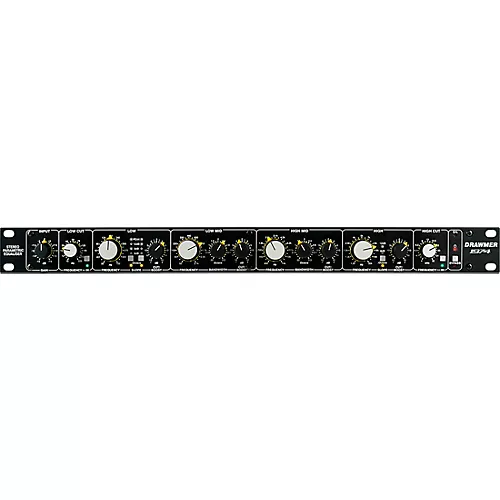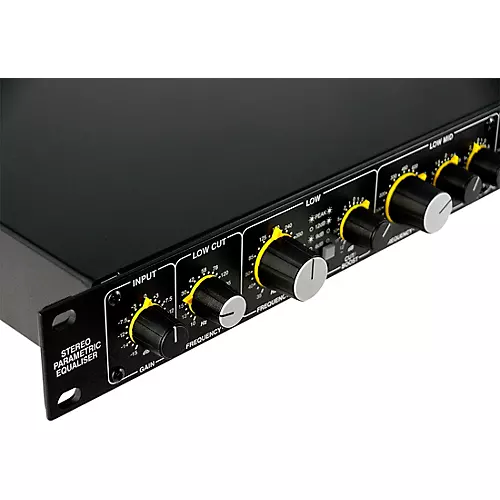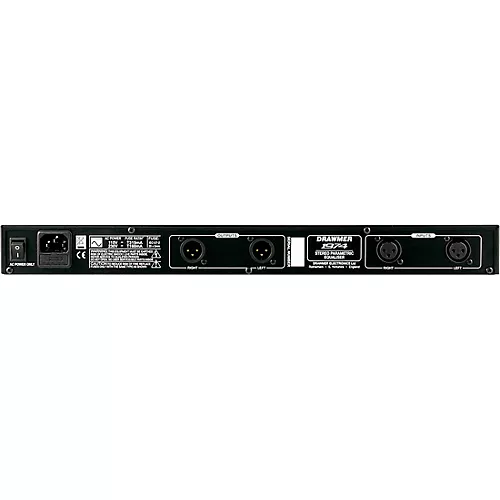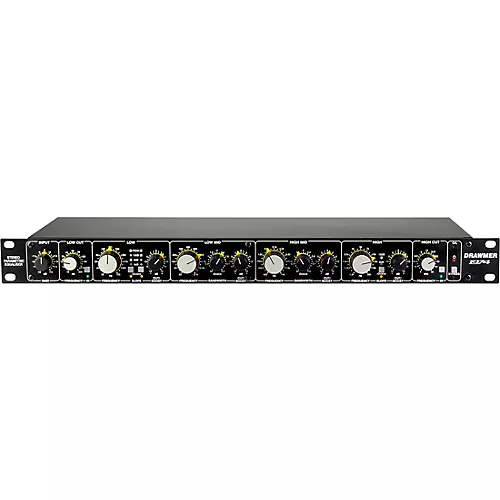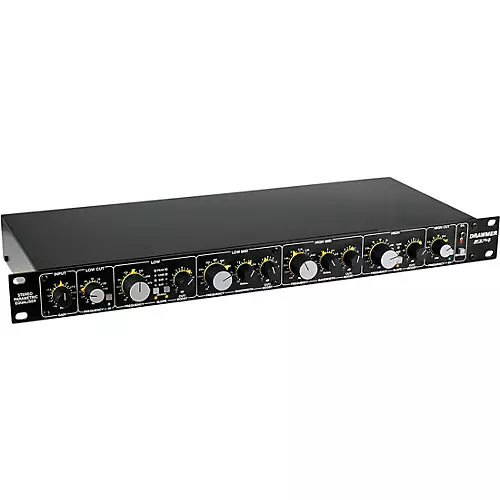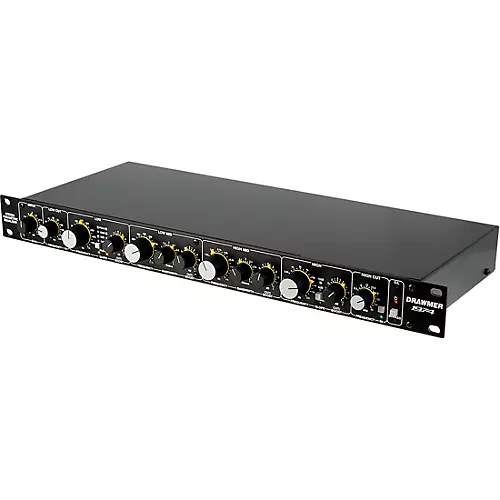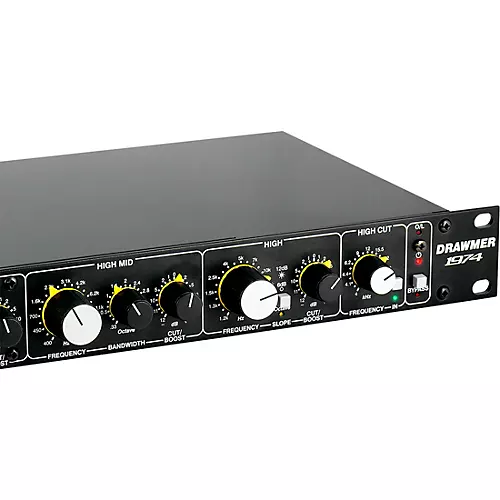Drawmer 1974 Stereo Parametric Equaliser
Quantity
-
DetailThe vintage-style fully stereo 1974 four-band Parametric Equalizer provides exceptional analog musicality and sonic clarity, taking its inspiration from 1970s-era gear. It has the ability to perform subtle shaping for mastering purposes that require a delicate touch and easy recall, but is just as capable of tonal sculpting—adding the analogue warmth and character that is near impossible to emulate in the digital domain. Get immersive with the stereo operation, with one set of controls for both channels. The versatile design features dual channel precision stepped potentiometers, providing exceptional accuracy for fast and simple recall. The fully variable bandwidth allows you to control the parametric mid bands, making adjustments as surgically precise or as broad and natural sounding as you could ever require. Fully adjustable low and high cut filters are also included, ideal for tuning out undesirable signals at the frequency extremes. It also features a switchable slope allowing you to alter the focus at the high and low frequencies plus a low peak setting that magnifies the bottom end. The 1974 is perfect for tonal shaping, staying true to the sound of the 70s and ideal for any musician.Genuine Stereo Operation with Indented and Accurate PotentiometersThe genuine stereo linked operation of the 1974 makes adjustment quick and simple using just one set of controls to alter both channels. No more fiddling with every control trying to match the settings of the left and right channels with each other. The 1974 uses precision potentiometers, each one being matched for left/right accuracy to within fine tolerances by trained technicians, so both channels operate identically, and also have indented operation, providing exceptional accuracy for fast and simple recall.Fully Parametric with Totally Variable BandwidthThe 1974 is a true parametric equalizer, with the four bands having fully variable frequency controls and offer cut and boost of +/-12dB's. However, unlike EQs with a no bandwidth adjustment or a simple switch, the two mid bands have completely variable filter bandwidth controls. This enables the user to focus in on very narrow sections of the audio spectrum or apply a broad natural sounding filter, or, of course, anything in between the two. The 1974 incredibly versatile and capable of modifying everything from subtly fine tuning mixes to tone sculpting problematic recordings.Variable Low and High Cut FiltersThe 1974 also includes fully variable low and high cut filters, ideal for tuning out undesirable signals. The low cut (otherwise known as High Pass Filter) having a range of 10Hz-225Hz and the high cut (otherwise known as Low Pass Filter) 4kHz-32kHz. The beauty of being fully variable is that, unlike fixed frequency filters, it is easy to sweep both controls to find the perfect setting and remove sounds with pinpoint accuracy. This is especially useful when bracketing individual tracks where it will be necessary to cut the bass to remove rumble and top to remove hiss, as these undesirable signals will just add up as the tracks are layered. Switchable Slope SettingVery few analog parametric equalizers have an adjustable slope on the low and high cut filters, and is yet another feature of the 1974 that allows you to take control of your audio. The filter slopes of the 1974 have been chosen for their musicality - allowing you to adjust the focus of the audio at the bottom and top ends of your recording but not so harsh as to be a very noticeable brick wall filter. At the bottom end slopes of 6, 9 and 12dB per octave plus a Peak setting are available, and at the high end 6 and 12dB's per octave. The Peak setting adds a narrow bell shape to the 12dB per octave low cut filter at the knee frequency just before it rolls off. Especially useful on kick drums, it magnifies and gives extra weight to the hit whilst still filtering out any subsonic junk and without muddying the lower mid. It'll give your kick an added sense of power and precision.
-
Customer ReviewsNo comments

 Fender
Fender Gibson
Gibson Taylor
Taylor Martin
Martin lbanez
lbanez Epiphone
Epiphone PRS
PRS Schecter Guitar Research
Schecter Guitar Research Fender Stratocaster
Fender Stratocaster Fender Telecaster
Fender Telecaster Gibson Les Paul
Gibson Les Paul Gibson SG
Gibson SG lbanez RG
lbanez RG Taylor American Dream
Taylor American Dream Taylor GS Mini
Taylor GS Mini Martin GPC
Martin GPC lbanez
lbanez Fender
Fender Squier
Squier Ernie Ball Music Man
Ernie Ball Music Man Sterling by Music Man
Sterling by Music Man Rickenbacker
Rickenbacker Sire
Sire Schecter Guitar Research
Schecter Guitar Research Fender Precision Bass
Fender Precision Bass Fender Jazz Bass
Fender Jazz Bass Fender Mustang
Fender Mustang lbanez SR
lbanez SR Strandberg Boden
Strandberg Boden Yamaha TRBX
Yamaha TRBX Yamaha BB
Yamaha BB Schecter Stiletto
Schecter Stiletto Fender
Fender Marshall
Marshall Orange Amplifiers
Orange Amplifiers Markbass
Markbass Boss
Boss Blackstar
Blackstar Kemper
Kemper Vox
Vox Line 6
Line 6 Electro-Harmonix
Electro-Harmonix MXR
MXR Meris
Meris Dunlop
Dunlop EarthQuaker Devices
EarthQuaker Devices lbanez
lbanez TC Electronic
TC Electronic Alesis
Alesis Roland
Roland Zildjian
Zildjian DW
DW Simmons
Simmons Meinl
Meinl Remo
Remo TAMA
TAMA Pearl
Pearl Vic Firth
Vic Firth Sound Percussion Labs
Sound Percussion Labs Evans
Evans Sabian
Sabian Lp
Lp Yamaha
Yamaha Yamaha
Yamaha Roland
Roland Korg
Korg Williams
Williams Akai Professiona
Akai Professiona Casio
Casio Nord
Nord Moog
Moog Williams Legato
Williams Legato Yamaha Clavinova
Yamaha Clavinova Harbinger
Harbinger Bose
Bose JBL
JBL Electro-Voice
Electro-Voice Behringer
Behringer Yamaha
Yamaha Mackie
Mackie JBL EON
JBL EON Bose L1 Pro
Bose L1 Pro QSC K Series
QSC K Series Yamaha Mixers
Yamaha Mixers Harbinger VAR!
Harbinger VAR! Focusrite
Focusrite Universal Audio
Universal Audio Yamaha
Yamaha PreSonus
PreSonus Tascam
Tascam KRK
KRK Rode
Rode Focusrite Scarlett
Focusrite Scarlett Universal Audio Apollo
Universal Audio Apollo Shure
Shure Sennheiser
Sennheiser AKG
AKG Neumann
Neumann Rode
Rode Sterling Audio
Sterling Audio Audio-Technica
Audio-Technica Warm Audio
Warm Audio AKG 414
AKG 414 Musician Geal
Musician Geal Fender
Fender D'Addario
D'Addario Ernie Ball
Ernie Ball Elixir
Elixir Road Runner
Road Runner Gator
Gator Proline
Proline Remo
Remo Livewire
Livewire On-Stage
On-Stage Hercules
Hercules Mogami
Mogami Dunlop
Dunlop Perri's
Perri's Snark
Snark
